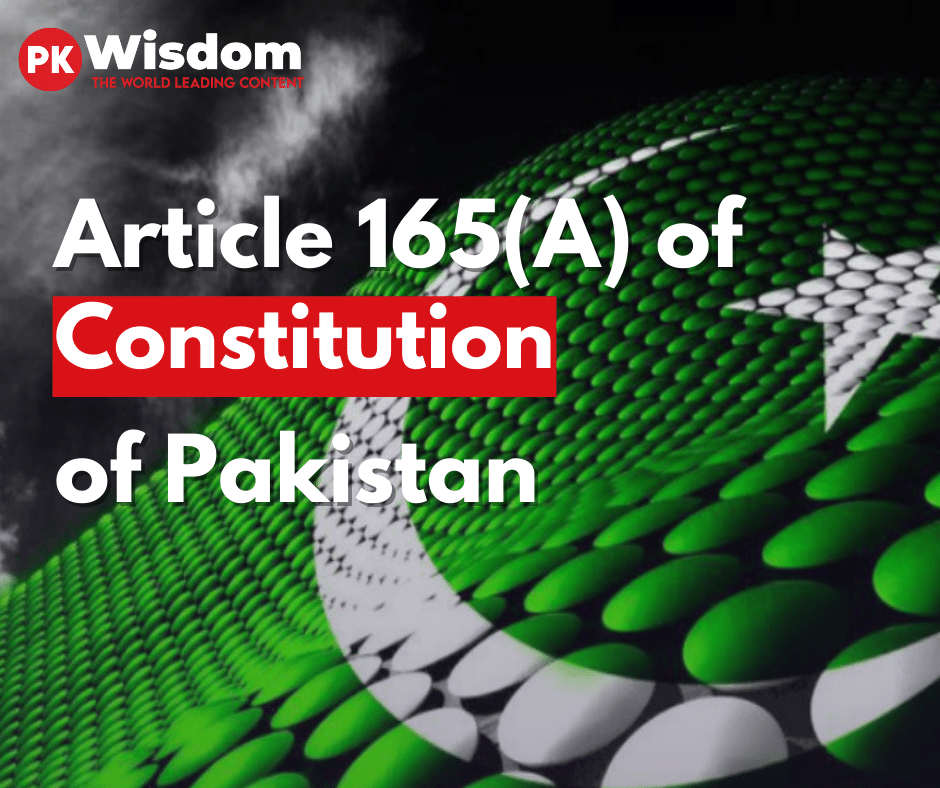Overview of Article 165A of the Constitution of Pakistan
Woven into the constitutional fabric of Pakistan, Article 165A stands as a sentinel, guarding the authority of Majlis-e-Shoora (Parliament) in matters of taxation. Enacted within the Constitution of Pakistan 1973, this article not only empowers Parliament to levy taxes on the income of specific entities but also retroactively validates prior fiscal actions. As we embark on an exploration of Article 165A, we delve into the intricacies that shape the fiscal landscape of Pakistan.
Article 165A States
165A. Power of Majlis-e-Shoora (Parliament) to impose tax on the income of certain corporations, etc
- Majlis-e-Shoora (Parliament) has, and shall be deemed always to have had, the power to make a law to provide for the levy and recovery of a tax on the income of a corporation, company or other body or institution established by or under a Federal law or a Provincial law or an existing law or a corporation, company or other body or institution owned or controlled, either directly or indirectly, by the Federal Government or a Provincial Government, regardless of the ultimate destination of such income.
- All orders made, proceedings taken and acts done by any authority or person, which were made, taken or done, or purported to have been made, taken or done, before the commencement of the Constitution (Amendment) Order 1985, in exercise of the powers derived from any law referred to in clause (1), or in execution of any orders made by any authority in the exercise or purported exercise of powers as aforesaid, shall, notwithstanding any judgment of any court or tribunal,including the Supreme Court and a High Court, be deemed to be and always to have been validly made, taken or done and-shall not be called in question in any court, including the Supreme Court and a High Court, on any ground whatsoever.
- Every judgment or order of any court or tribunal, including the Supreme Court and a High Court, which is repugnant to the provisions of clause (1) or clause (2) shall be, and shall be deemed always to have been, void and of no effect whatsoever.
Key Points of Article 165A of the Constitution of Pakistan
- Parliamentary Empowerment: At its core, Article 165A reinforces the authority of Majlis-e-Shoora (Parliament) in the realm of taxation. It explicitly grants the power, deemed always to have existed, to craft laws governing the imposition and recovery of taxes on the income of specified entities.
- Retrospective Validation: A distinctive feature of Article 165A is its retrospective validation of actions taken before 1985. Orders, proceedings, and acts related to taxation under the laws mentioned in this article are shielded from questioning in any court, including the Supreme Court and High Courts. This legal safeguard provides stability to prior fiscal decisions and actions.
- Nullification of Inconsistent Judgments: The article boldly nullifies any judgment or order of any court or tribunal, including the Supreme Court and a High Court, that runs counter to its provisions. Such judgments are deemed void and of no effect, establishing the supremacy of the legislative intent outlined in Article 165A.
Download the Constitution of Pakistan in PDF
Crux of Article 165A of the Constitution of Pakistan
The crux of Article 165A lies in its dual nature as an empowering force for legislative authority and a retrospective guardian of fiscal actions. It solidifies the constitutional role of Majlis-e-Shoora (Parliament) in shaping tax policies for specific entities, ensuring that the legislative arm remains central in matters of fiscal governance.
The retrospective validation introduces a layer of legal assurance, acknowledging the validity of actions taken before 1985. This not only fosters stability in the fiscal landscape but also underscores the intent to protect the integrity of prior decisions and maintain a consistent application of tax laws.
The nullification of inconsistent judgments serves as a declaration of the constitutional hierarchy, emphasizing that any interpretation or decision by a court that contradicts the legislative authority granted by Article 165A is deemed void. This reaffirms the supremacy of the constitutionally granted powers.
Conclusion: Article 165A of the Constitution of Pakistan
In conclusion, Article 165A emerges as a sentinel of fiscal authority within the constitutional framework of Pakistan. It not only empowers Majlis-e-Shoora (Parliament) to legislate on taxation matters but also fortifies the foundation of prior fiscal decisions through retrospective validation. This provision reflects a dynamic response to the evolving needs of governance, balancing legislative powers with a commitment to legal stability.
Navigating the nuances of Article 165A provides a window into the constitutional philosophy that underpins fiscal policies in Pakistan. It underscores the deliberate steps taken to ensure the resilience of the legal framework, acknowledging the need for retrospective validation to maintain consistency and protect the integrity of prior fiscal decisions.


